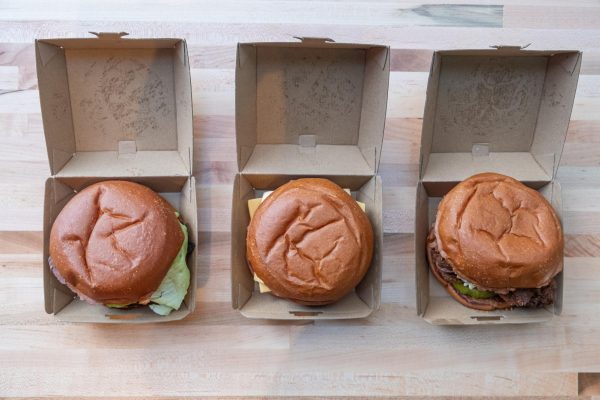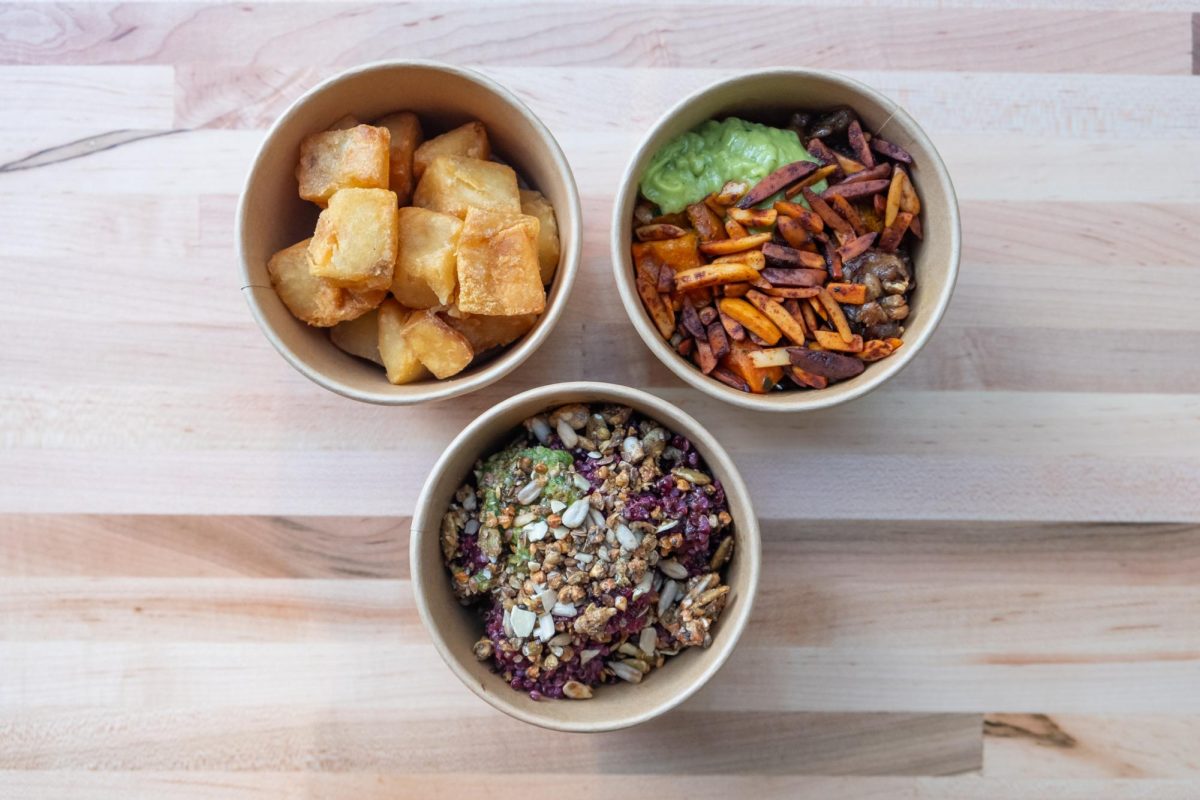There are a few things that you’ll immediately notice when you first walk into Kernel. First are the prices — $9 chicken sandwiches and $10 salads almost seem too good to be true. Behind the counter, you’ll see a giant robotic arm enclosed in a metal structure, passing off small portions of food to one of its human coworkers.
Complemented by a mint-green brick statement wall, bright orange barstools and millennial pink accents, the restaurant feels equal parts futuristic and trendy. But in addition to its unique business model, what truly sets Kernel apart is its vegetable-forward menu — where the side dishes are the star.
Created by Chipotle founder Steve Ells, Kernel opened on the corner of Lafayette Street and East Fourth Street in late October, following its first location in Flatiron in February. The chain builds upon Chipotle’s model of quick service and fresh meals — with the help of robot tech on the assembly line.
“In a normal restaurant, you have an expediter,” Andrew Black, Kernel’s chief culinary officer, said in an interview with WSN. “That’s sort of what the robot does. It accepts orders coming in and fires them at the right time.”
After an employee puts the final components together, the food is served cafeteria-style, enclosed in cardboard containers on bright green trays. While its prices are low in comparison to many fast casual chains in New York City, Kernel’s portion sizes tend to run small — a sandwich and a side totals up to $14.
Black, a former sous chef at the three-Michelin-starred restaurant Eleven Madison Park, brings high attention to detail to Kernel — and nowhere is this more evident than in the side dishes, all of which are different vegetables. Each side is just $5 and contains components that are crunchy, soft, tangy and salty, creating a balance of textures and flavors on par with dishes served at many of New York City’s upscale restaurants.
The Marinated Beets with Quinoa, for example, are accompanied by an herbaceous green hummus, made of peas, avocado and lemon juice. The beets themselves are tangy and bright, brined in vinegar and sugar then mixed with red quinoa, chives, parsley and tarragon and topped with a crunchy combination of pumpkin seeds, buckwheat, flax and other types of seeds. Another side, the Roasted Carrots with Farro, is finished with an avocado-based salsa verde, adding a refreshing finish to this earthy, nutty dish. The carrots are extremely tender, complemented by crunchy paprika-spiced almonds, a sweet date compote and chewy pieces of farro. The Crispy Potatoes side dish only contains one component — but their flaky-on-the-outside, pillowy-on-the-inside texture makes this menu item just as satisfying as the rest.
Kernel’s menu features four types of chicken sandwiches. While some components of the sandwiches felt left behind — small pieces of butter lettuce or thin slices of American cheese, for example — similar to the side dishes, the restaurant is deliberate in achieving a balance of flavors. The Herb Roasted Chicken Sandwich features smashed avocado and a creamy mustard aioli, whose tanginess carries the weight of this dish. The Classic Crispy Chicken Sandwich delivered a satisfying crunch as promised, though its small portion of creamy coleslaw was overpowered by the chicken’s richness. While the patty was a bit bland, the Veggie Burger with Cheese is a solid plant-based option, with a flavorful aioli that provided some much-needed salt.

Since Kernel’s opening, NYU students have made up about half of its customer base, according to Black. The chain aims to open more locations throughout Manhattan in the next few years — all of which will be centered around Kernel’s central kitchen near Union Square, which remains a core aspect of its business model.
“We make fresh food there every day from scratch with real chefs,” Black said. “We prep throughout the day and deliver [it] to our restaurants.”
Since much of the food prep takes place at Kernel’s central kitchen, its restaurants can use relatively small spaces, reducing overhead rent costs. This also means that by the time the food arrives at the restaurant, there are only a few steps left before serving. As a result, Kernel only has three employees working at any given time, allowing it to decrease labor costs while still paying its employees about $22 to $25 an hour, according to Black — well above New York City’s $16 minimum wage.
“We think we’ve started to create the next generation of restaurants,” he said. “We’re trying to solve a lot of problems that will eventually become bigger problems for traditional restaurants.”
Contact Lauren Ng at [email protected].























































































































































